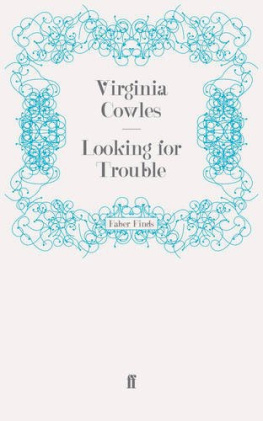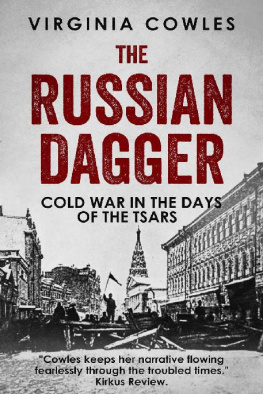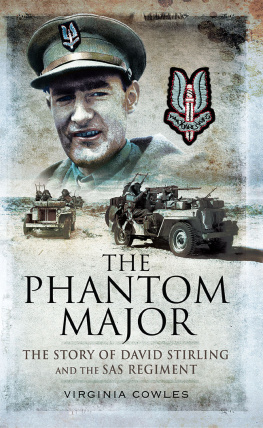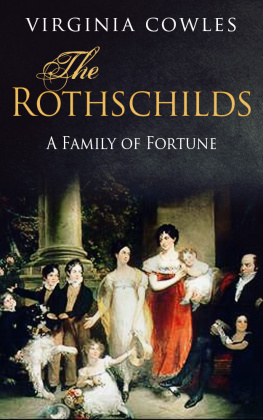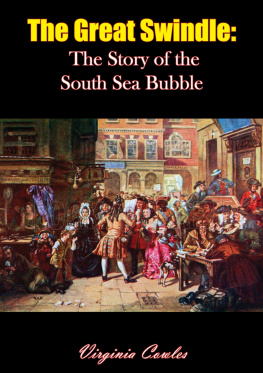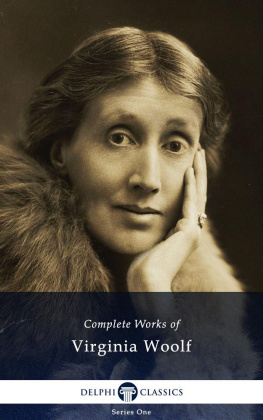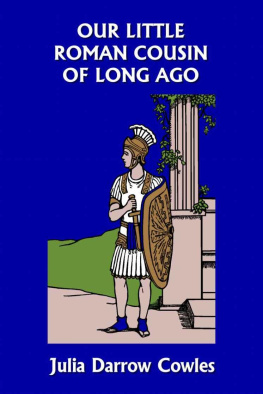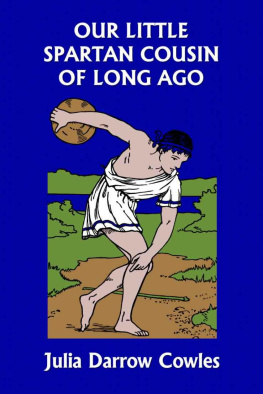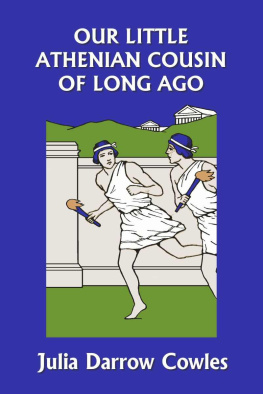Virginia Cowles - Looking for Trouble
Here you can read online Virginia Cowles - Looking for Trouble full text of the book (entire story) in english for free. Download pdf and epub, get meaning, cover and reviews about this ebook. year: 2011, publisher: Faber & Faber, genre: Detective and thriller. Description of the work, (preface) as well as reviews are available. Best literature library LitArk.com created for fans of good reading and offers a wide selection of genres:
Romance novel
Science fiction
Adventure
Detective
Science
History
Home and family
Prose
Art
Politics
Computer
Non-fiction
Religion
Business
Children
Humor
Choose a favorite category and find really read worthwhile books. Enjoy immersion in the world of imagination, feel the emotions of the characters or learn something new for yourself, make an fascinating discovery.
- Book:Looking for Trouble
- Author:
- Publisher:Faber & Faber
- Genre:
- Year:2011
- Rating:5 / 5
- Favourites:Add to favourites
- Your mark:
- 100
- 1
- 2
- 3
- 4
- 5
Looking for Trouble: summary, description and annotation
We offer to read an annotation, description, summary or preface (depends on what the author of the book "Looking for Trouble" wrote himself). If you haven't found the necessary information about the book — write in the comments, we will try to find it.
Looking for Trouble — read online for free the complete book (whole text) full work
Below is the text of the book, divided by pages. System saving the place of the last page read, allows you to conveniently read the book "Looking for Trouble" online for free, without having to search again every time where you left off. Put a bookmark, and you can go to the page where you finished reading at any time.
Font size:
Interval:
Bookmark:

For
MY SISTER MARY
with all my love
On that November evening (Armistice Night), the three men at the head of Great Britain, the United States and France seemed to be the masters of the world. Behind them stood vast communities organized to the last point, rejoicing in victory and inspired with gratitude and confidence for the chiefs who had led them there. In their hands lay armies of irresistible might, and fleets without whose sanction no vessel crossed the sea upon or beneath the surface. There was nothing wise, right and necessary which they could not in unity decree. And these men had been drawn together across differences of nationality and interest and across distances on land and sea by the comradeship of struggle against a dreaded foe. Together they had reached the goal. Victory absolute and incomparable was in their hands. What would they do with it?
TheWorldCrisis:TheAftermath.
WINSTON S. CHURCHILL . March, 1929.
T HERE is a full moon shining down on London and overhead you can hear the drone of German bombers. The streets are deserted, but every now and then the stillness is broken by the wracking explosions of the guns.
On nights like this you wonder if future historians will be able to visualize the majesty of this mighty capital; to picture the strange beauty of the darkened buildings in the moonlight; the rustle of the wind and the sigh of bombs; the long white fingers of the searchlights and the moan of shells travelling towards the stars. Will they understand how violently people died: how calmly people lived?
Long ago Britons set out to master the sea for fear it would imprison them on their island. To-day the same sea holds them secure against their enemies, and, so long as the great water highways remain in their control, their land can be attacked only from the air.
So far, the air has not proved decisive. The terror of the night-bomber is combated by the robust spirit of the people, and the accuracy of the day-bomber destroyed by the fierce onslaught of the Royal Air Force.
The air battles fought over the English coast have been more spectacular than any battles history has seen before. When German planes, in mass formation, approached the cliffs of Dover they were met by a shattering barrage of anti-aircraft fire, and then by the swift, angry whine of fighters. Many of these battles were fought over the sea. I have often stood in the sunshine on top of Shakespeare cliff, a mile from the town, and watched the twisting, turning planes with a feeling of unreality. Somehow it was always difficult to grasp that these were the actual combats on which civilization depended; that although modern armies were counted in terms of millions, the sea had immobilized their strength and the issue was being decided by a handful of men above.
Of all the days I spent at Dover I remember August 15th the best. On this day the Royal Air Force shot down a record number of one hundred and eighty planes. I drove down from London with Vincent Sheean and from the cliff we tried to piece the drama together like a jigsaw puzzle. In almost the whole range of the sky there was action. To the right we could see a plane falling like a stone into the sea, leaving a long black plume against the sky; to the left, one of the great silver balloons in flames; and directly above, a fighter, diving down on one of the bombers and suddenly a tiny fluttering parachute as one of the pilots baled out; and all the time the crackling noise of the anti-aircraft guns fire and the white bursts of smoke against the sky.
During one of these battles I looked through a pair of field-glasses at a small trawler anchored in the harbour below. The crew had evidently accepted the fierce encounters above them as part of their daily routine, for no one was paying much attention. One of the men was lying on the deck fast asleep; another was doing his washing, and a third was reading a paper. A few hours later the little trawler hoisted up its flag, got up steam, and went paddling nonchalantly down the Channel. It had an arrogant air as though it were saying: Hands off; this sea is ours.
We watched the battle for some time, then Vincent turned to me and said, Its funny to think all this business started down there. He nodded towards the mists.
Down there?
In Spain.
Undoubtedly future historians will puzzle over the lessons that were never learned from the first world war; they will shake their heads that the three great democracies refused to join hands and accept their responsibilities as the guardians of world peace. They will trace the causes of the present conflagration to the breakdown of the League of Nations, pointing to Manchuria in 1931 and Abyssinia in 1935. But they will have to turn to Spain in 1936 for the first rumble of gunfire to break the stillness of the European continent; and it is in Spain that my story begins.
I saw the villages of Spain burning and followed the flames across the map of Europe. They spread upwards, scorching the woods of Bohemia, ravaging the plains of Poland, and even searing the ice-bound forests of the Arctic. Then the evil winds of conquest blew them to Norway. They swept through Holland and Belgium and burnt the rich fields of France black, so that now there is no life stirring.
The part I have seen is small in the picture history will record, but it has shown me that the war to-day is not only an issue between nations. It is a struggle to keep justice and mercy on the earth, and to preserve the very dignity of man.
LONDON , May 1941.
I F you look back over the newspapers of March 1937 you will recall a number of things: that the Normandie beat the record for the Atlantic crossing; that King Leopold visited London; that Neville Chamberlain succeeded Stanley Baldwin as Prime Minister of England; that the lost diary of Dr. Samuel Johnson was found; that Queen Marie of Roumania was gravely ill; and that Noel Coward was resting.
You will also read that General Franco launched an offensive . On March 10th the newspapers reported that he had broken through the Madrid defences and on the following day the correspondent of the London DailyTelegraph wrote:
The Nationalists have advanced eighteen miles in two days. They are now fifteen miles from Guadalajara. The defenders of Madrid realize that the battle of Guadalajara will decide the fate of the capital.
A few days later the story began to trickle out and the world learned that not only was Madrid still standing, but that Francos Italian Legionaries had broken and fled, and the Nationalist offensive had been turned into the first (and what proved to be the last) major victory for the Republic.
It was a week after the battle of Guadalajara that I made my first trip to Spain. I stood at the Toulouse aerodrome at five-thirty in the morning waiting for an aeroplane to take me to Valencia. It was pitch black and bitterly cold. The frost on the ground shimmered through the darkness like a ghostly shroud, and the small red bulbs outlining the airfield had an eerie glow. My heart began to sink at the prospect of the trip.
I had no qualifications as a war correspondent except curiosity. Although I had travelled in Europe and the Far East a good deal, and written a number of articles, mainly for the March of Events section of the Hearst newspapers, my adventures were of a peaceful nature. In fact, after a twelve-months trip from London to Tokio in 1934, I had written an article for HarpersBazaar
Font size:
Interval:
Bookmark:
Similar books «Looking for Trouble»
Look at similar books to Looking for Trouble. We have selected literature similar in name and meaning in the hope of providing readers with more options to find new, interesting, not yet read works.
Discussion, reviews of the book Looking for Trouble and just readers' own opinions. Leave your comments, write what you think about the work, its meaning or the main characters. Specify what exactly you liked and what you didn't like, and why you think so.

